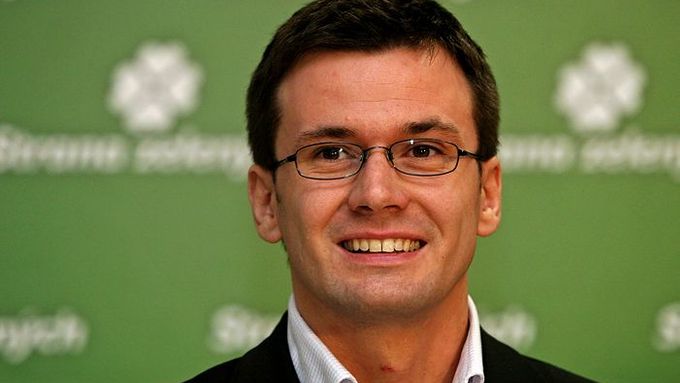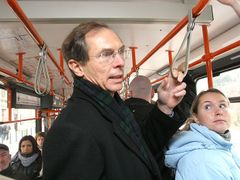LAST SUNDAY The Green Party, junior member of the ruling coalition of the Prime Minister Mirek Topolánek, finally agreed - after two months of deliberations - on who will succeed Dana Kuchtová, the first cabinet's member to have been axed, as the new Minister of Education.
The party's Deputy Chairman, Ondřej Liška, whose nomination by the party leadership has been known for several days, got a green light from the party's republic caucus, and at the age of 30 is set to become the government's youngest minister.
And he'll be given a real baptism by fire. It has been confirmed by the leaders of the education workers' trade union on Sunday that schoold across the nation will go on strike on Tuesady to push for higher salaries.
"We have heard enough promises since 1989. What we want is a real solution, which has not been proposed by any politician so far. This will be a strike on behalf of good educational system and satisfied students," the trade union boss František Dobšík said in a debate on Czech TV.
Before Liška can roll up his sleeves and throw himself straight into the ungrateful task of heading the perennially underfunded government department, he has to get a confirmation from the president Václav Klaus. While mostly a formality, it will not be completely painless, as Mr. Klaus made it clear he would sign the nomination of Mr. Liška "with trembling hands" given the fact that the young man is to be placed above all the university rectors and their kind.
Crucially, Mr. Topolánek had already said he considers Mr. Liška perfectly fit fot the job which makes the ageist (yes, the young can be discriminated against too!) remark of Mr. Klaus rather irrelevant.
--
On Wednesday, Václav Klaus became the first official presidential candidate for the neyt February's election. The incumbent has been nominated by the lawmakers of the Civic Democratic Party (ODS), which he had founded in early 1990s.
All 122 ODS members of the parliament signed the document, handed over to the parliamentary body overseeing the elections. To underscore the symbolism, it has been done at 12:20 sharp, on the day which marked the fifth anniversary of the nomination of Mr. Klaus for his first term in office of the head of state.
It is still not clear who will challenge him in the election, the outcome of which is not decided by the public in the Czech Republic, but by the people´s elected representatives in both houses of the parliament where ODS is the strongest faction in each chamber. The most serious contender, professor of economics (like Klaus himself) at the University of Michigan, Jan Švejnar, is to give his final word this week.
He said he would only run if he feels a tangible support in the parliament. So far only the Green Party and the Social Democrats, the strongest opposition party, gave him their support. Christian Democrats and Communists also showed some sympathy towards Mr. Švejnar's potential presidential bid but are still hedging their bets.
--
Despite all of its shortcomings, the Czech Republic is just about the best country to live in the whole Central and Eastern Europe, the latest United Nations Human Development Index (HDI), released last week, shows. Among the post-communist countries of the region, only Slovenia placed higher, finishing 27th of the 177 states included in the rankings, presented annually since 1990 and based on the figures for life expectancy, educational levels and real per capita income.
Czechs slipped to 32nd spot, but it can be explained not by the things taking a turn for the worse here, but by the progress achieved by Barbados and oil-rich sultanate of Brunei which have both overtaken the Czech Republic in the index. There is still plenty of room for improvement, the authors of the study said, especially in the areas of gender equality and the greenhouse gas emissions.
"If all countries in the world were to emit CO2 at levels similar to Czech Republic's, we would exceed our sustainable carbon budget by approximately 412%," the report warns.
--
The average monthly salary in the Czech Republic is 21,470 Czech crowns, according to the latest figures released last week by the Czech Bureau of Statistics (ČSÚ). It represents an increase of 1,517 crowns over a period of one year.
The prices have gone up by 2,5 per cent over the same period with the real wages going up by five per cent. Interestingly, the lowest increase of the nominal wages was registered in the fishing industry (2,1 per cent).
Luckily enough for the poor folks, the numbers came out just in time for the price of carp, the regular fixture of Czech Christmas dinner since times immemorable, to be raised (once again).
The loaded fish-tanks hit the streets of Czech and Moravian cities every December, never failing to scare the unsuspecting, uninitiated foreign visitors, who get to witness the odd tradition of fish massacre up close and personal.
--
The Czech national football team has had a second favorable draw in row last Sunday. After getting a very easy qualifying group a week ago, which makes it imperative for the national squad to advance to the World Cup in South Africa in 2010, they have had luck once again in the draw for the upcoming European Championship in Switzerland and Austria next summer.
They are to play against Switzerland, Turkey and Portugal in Group A, considered one of the easiest at the tournament.
Their first match against the Swiss squad will open the Euro 2008 on June 7th. A tough match against the runners-up of the last European Championship, the team of Portugal, will follow on June 11th and the last (hopefully, just in the group) game of the Czech team is to be played against Turks on June 15th.




